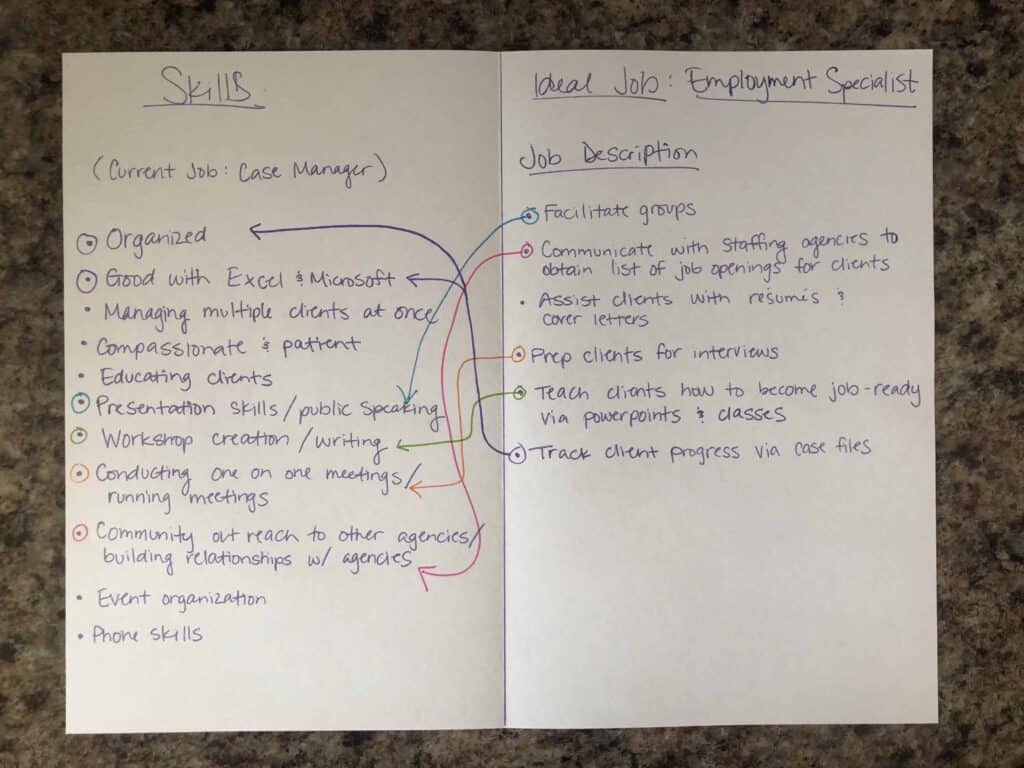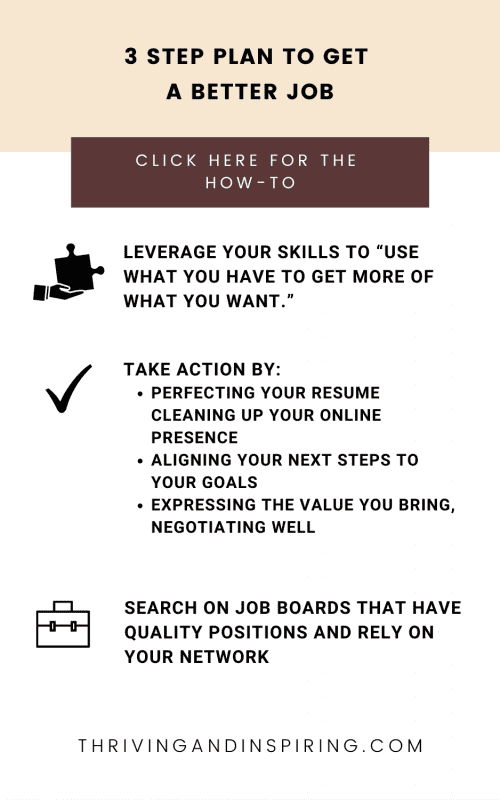I hurriedly fixed my bobby pins and checked the car mirror one last time before stepping out and putting my blazer on. I was on my way to interview for a very different job than I had at the time, but I felt fully confident in my ability to do this new job because I know how to leverage my skills to get a better job.
The interview went great and I basically got the job by the end of it (even though I didn’t end up taking it for other reasons).
If you’re feeling stuck in your current job or unsure of what job suits you that you have the skills for, stick with me because I’m about to unveil exactly how to get a better job. By the end of this post, you’ll feel empowered because you will have learned how to leverage your skills and that will allow you to get a better job!
Quick side note:
If you’re wondering why I’m qualified to help you get a better job, I’m an Employment Specialist and I’m here to gently guide you toward a job that you LOVE where you can use the skills you already have!
This post may contain affiliate links which means I’ll receive a commission if you purchase through my links, at no extra cost to you. Please read full disclosure for more information.

Leveraging Your Skills
Okay, what does that even mean?!
Let’s break it down. It’s quite simple, really. Leveraging your skills just means using the skills you already have in some new way or new capacity. It’s about exercising the skills you have and capitalizing on them to land a job or promotion that requires some of those skills (plus maybe some skills that you don’t have yet).
You can actually propel yourself forward in your career by leveraging your skills.
| Related reading: 17 Ways to Visualize Your Highest Self and Start Showing Up as Her
Leveraging skills can be taken a bit further by applying the skill in a different way.
For example:
If you are currently a retail associate who lays out new products in the women’s clothing department, your skills might include organization and neatness, and managing stock/inventory.
When you’re ready for your next career move, you can leverage your skill of managing inventory. You could consider applying for jobs that require that skill in a different setting. Maybe you think about becoming a warehouse shift leader since you have experience recovering lost inventory, keeping track of orders, and so on.
See how the warehouse shift manager position is quite different, yet you marketed your inventory experience and labeled it as a skill set that is important in the new role?
You’ve also leveraged your role in the women’s clothing department by capitalizing on the fact that you were in charge of displaying products in that department. Your experience leading a department in that way could qualify you to lead a warehouse too. It’s all about how you take what you’ve done and apply it to another setting and other job duties.

LinkedIn defines leveraging skills as, “using more of what you are good at to get more of what you want.” (Reference)
Okay, so HOW do you Leverage Skills?
Try this:
1. Get a pen and paper, and fold it in half then unfold it to create two sections. List out all your skills in section one.
Tip:
To help jog your memory of the skills you use daily in your current job, think about the tasks you do on the regular, then ask yourself what skills are required to do those things.
2. When you’re done writing down your skills, think about the type of job you want next, and write the job title at the top of section two.
Then, start listing the job duties of your ideal job in section two.
Tip: You may want to do a quick Google search like, “(job title) job duties” for some inspo.
3. Start drawing lines to match the job duties in section two to your skills in section one.
They should relate, so make sure you’re only matching the job duties to skills that are required for the duties. It’s totally okay and normal to have just a few matches, and that’s all you need to make a case for yourself as a fit for this new ideal job.
Check out this example:

Are you starting to see how you can use what you already have to make a case that you’re a fit for a job that requires some of what you have? (Plus look on the left in the picture above- there are other skills that are worthwhile and can be put to good use in other ways in this possible new job!)
Sure, in the example above, this person doesn’t have experience professionally writing resumes and cover letters, but they have a host of other experience and skills that make them quite a good candidate!
Side note:
Job descriptions are always overzealous! There’s usually not a candidate with every single skill and all the experience required. HR departments write job descriptions with hopes of hiring someone with most but not all of the requirements, so rest easy here.
Okay, so what now…
Tip:
Now that you know what it means to leverage your skills and how to do it, how do you use that to get a better job?? You can leverage your skills in the way you write your resume, to get an idea of what jobs you can expand your search to and apply for, and in the way you talk about yourself in an interview.
(And for when you need help navigating all those offers, read this!)

Action Steps
Now that you’re comfortable with how to go about leveraging your skills, let’s talk about the nitty gritty- how to get a better job.
Here are a few actionable steps you can take.
1. Perfect That Resume
This could be a whole blog post by itself, and I have so much to say about this topic, naturally, since I’m an Employment Specialist by day.
That’s why I wrote an ebook about it. Get it for FREE here.
The time it takes to fix up that old, cobweb-filled resume will absolutely be worth it. Leveraging your skills starts here! Sure you can talk about your skill set and how you’re a fit for your ideal role all you want in an interview, but you have to get the interview first! And a killer resume will get you there!
Once you’ve created the very best resume you can, show it off in interviews by carrying a little portfolio!
Learn how to leverage your skills best in your resume here.
2. Clean Up and Build Your Online Presence
How much this matters definitely depends on the industry.
Cleaning up your online presence means…
Taking control of how you show up online. You get to decide what kind of stuff pops up when someone searches for you.
Your online presence just means how you show up when someone looks for you on the internet. Most of the time, before you’re hired, the employer has Googled your name at the minimum.
Try it! What comes up when you search for yourself? Is it your Instagram account with pictures that don’t make you look like the most professional employee? Yes, Instagram is for your personal use, but it still shows up in the world and could negatively impact your likelihood of getting your ideal job if you’re not careful.
As you start to clean up your online presence, I’d suggest starting by making your social media accounts private.
You may want to go as far as archiving posts that don’t show you in the best light or take away from how you want to portray yourself.
You can build your online presence by…
1. Starting a LinkedIn account if that’s relevant for your industry or field.
If you’re going for a warehouse manager position, odds are, the hiring manager for that position isn’t on LinkedIn.
But, if you’re in a field like tech, health care, education, or finance, your future bosses are likely hanging out on LinkedIn.
You could spend a chunk of time creating a LinkedIn profile, and if it seems too overwhelming, start by creating a stellar tagline that represents who you are as a professional. You are your brand!
And then, work on a solid summary.
Your summary can be in the first person (unlike how you would write on a resume), and it can be a bit more casual than your formal resume feels. Your LinkedIn summary can be pretty long and explain who you are as a professional. Don’t be afraid to show who you are- it doesn’t have to be boring. Talk about the passions behind the work you’ve done. Discuss how you’ve made an impact with the work you do.
Here are a few examples!
If you stand for making people feel good, and uplifting others (like me) then post lots of content about that! Or if you’re all about body positivity, create or share content on that topic.
Having thought-provoking content following your name will only ever do good things for you!
3. Align Your Next Step with Your Goals
After all, we’re talking about how to get a better job, so it makes sense to create relevant goals and take logical, calculated steps toward them.
I’ve already written about how to set and achieve goals, so we’ll move on to the next part.
You may want to try out a goal-setting journal, too!
Once you’ve set appropriate goals related to landing your next job, you need to ensure that you have a succession of steps to take that will bring you toward your goal.
Having a goal of becoming a business owner is great. But the goal in and of itself doesn’t tell me what to do to get there. I’d need to outline some practical steps in an order that makes sense, such as:
- Develop a business plan, take xyz online course, do market research, hold a soft launch, evaluate my stats, advertise xyz, launch product, analyze what went well and what didn’t, adjust plan and take further action…
With those steps in mind, the first thing I do shouldn’t be to hire an assistant to help me create my product. Even though that might be tempting to do, it wouldn’t be wise and might put me behind on my budget early on and derail my whole project.
This is why it’s important to align your next steps with your goals. It keeps you on track and helps you take intentional and smart steps forward toward your goal. It also helps you maximize your time, effort, and resources.
This will help you get a better job because your movements will be calculated and thought through. The whole throwing-spaghetti-on-the-wall-to-see-if-it-sticks method does NOT work, friend.
| Related Reading: 34 Best Books on Finding Your Passion so You Can Live Out Your Purpose in Life
4. Know Your Value and What you Bring to the Table
Once you get a handle on leveraging your skills and you’re comfortable using the skills you have to get what you want, it will be easier for you to know your value.
Leveraging your skills helps you get a better job because you’re clearer on what you bring to the table and how much value you offer to a company.
Nobody else has the experience you have, so you can confidently say that you offer a unique perspective.
Understanding what skills you already possess that you can bring into a new role will give you the confidence you need to state your case on why you’re the best fit for a particular role.
5. Negotiate Well
Do not be afraid to negotiate! When you do get that offer, you have the right to negotiate the specifics. Maybe that’s asking for more vacation days, a work-from-home hybrid schedule, or higher pay. But friend, once you know your value, don’t be afraid to ensure you are compensated appropriately for the value you bring!
Negotiation is about give and take though. Sure, play a little hardball if you’re comfortable, but compromise is okay too. Remember, you will be working there after the negotiation is over, so hold yourself in a way that you’d be proud of.
Oftentimes you can end up with a better job title, more flexibility, or whatever is important to you so long as you have substantial proof that you’re worth that.
Come ready with facts and figures to show that the value you bring is worth the extra thing(s) you’re asking for.
My grandma once gave the advice to ask for a whole $10,000 more per year, and don’t you know, the employer granted the request! You never know until you ask.

Where to Search for Your Next Job
When considering how to get a better job, where you look for work matters.
The type of job board you use matters…
I personally love ZipRecruiter, LinkUp, LinkedIn, Glassdoor, and yes… Indeed.com (as overdone as it may be).
The first four, I find, have the most quality jobs. I find the most legitimate jobs here. Some other job board sites like Monster, Snag a Job, SimplyHired, or CareerBuilder seem to have more sketchy or even illegitimate jobs that list salaries that aren’t always accurate.
Shoot for quality job boards that are reputable.
I hesitated to mention Indeed because sometimes it can be a bit of a black hole where you apply and just never hear back. However, my clients have had the most success with Indeed. It seems that Indeed has a higher rate of responses from employers than most other job boards.
You can also try remote sites such as…
FlexJobs, Remotive, FreeUp, and Remote.co. These are great places to start that have job postings in various industries.
Or consider…
Outsourcely, We Work Remotely, Dice, and Remote Jobs Club for more industry specific jobs.
It’s All About Who You Know
I know it’s cringy and uncomfortable but network, network, network!
Most of the time, jobs are filled by people who know someone in the company. So get your tushy out there and make relationships with people who work where you want to work!
Keep in mind though, that networking is a two-way street. This means that you have to bring something to the table too. You cannot seek out people to add to your network and only want them to make connections for you while you sit back with your feet up. You have to bring something to the relationship too.
And you should always be nourishing the relationships in your network. Yes, all the time! Even when you’re not job searching! Sounds crazy but that’s how relationships are built. Then, when you need an introduction or want to call on your network to get your foot in the door somewhere, you’ve already been cultivating those relationships. This, my friend, is how to get a better job!
You can build your network by…
Reaching out to people in your past experience via email just to check in. And, you can connect with people who work where you want to on Linkedin. Remain active with your network. Send out holiday greetings, reach out with valuable information every so often, ask what they need, and so on.
You never know when someone in your network will be just the connection you need to land your ideal job!
You can keep track of those in your network with an address book. It may seem old-fashioned, but it can honestly be super helpful to have on hand when you’re in the middle of a job search.
I heard a story once where someone’s neighbor was heavily involved with a company he’d always wanted to work for. The neighbor made a simple call and he got a job! And it all started with a small relationship.

Let’s Bring it Home
To boil all that down, here’s how to get a better job:
- Leverage your skills to “use what you have to get more of what you want.” Write your resume in a way that reflects the skills you possess that are required for the job. Make it clear that your experience has given you the skills needed! In an interview, highlight how your skills gleaned from different experiences are transferable to this new job.
- Take action by perfecting your resume, cleaning up your online presence, aligning your next steps to your goals, expressing the value you bring, and negotiating well.
- Search for your next job on job boards that serve up quality positions and rely on your network (or start growing your network and building relationships).

So if you’re feeling stuck in your current job or unsure of what job is good for you, work through the three steps above and pave your path toward your ideal job!
Share this post with someone who could benefit from it!
And follow me on Pinterest for encouraging graphics!

Great article – very empowering! Love the tips on Leverage Skills. Thank you!
Thanks Karin! Glad you found the tips helpful! Leveraging our skills is our most powerful tool when upskilling and finding a new job! 🙂
Great suggestions. I counsel students on applying to jobs. Teaching them to refrain academic language into their choose field is important. My common example is always changing “I tutored students” to “I communicated complex ideas to individuals with varied backgrounds.”
Yes, love this example! Refraining from industry specific jargon is important and can make or break landing an interview!
Great tips. I like LinkedIn; it is a great place to market your skills. Thanks for sharing.
I like LinkedIn; it is a great place to market your skills. Thanks for sharing this great tips.
Agreed, LinkedIn can be scary at first, but it’s worth the time to make a profile and network on this platform!